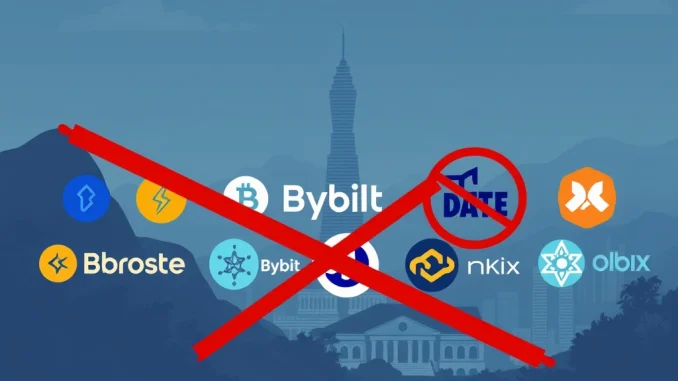
An important development is unfolding in Thailand’s digital asset space. The nation’s financial watchdog, the Securities and Exchange Commission (SEC), has announced it will block access to several prominent cryptocurrency exchanges. This move targets platforms allegedly operating without the necessary licenses, signaling a firm stance on compliance within the country.
What’s Happening with Thailand SEC and Crypto Exchanges?
According to reports, including one from Wu Blockchain on X, the Thailand SEC is taking decisive action against five specific cryptocurrency exchanges: Bybit, 1000X, CoinEx, OKX, and XT. The regulator plans to initiate blocking measures against these platforms starting June 28. The core reason cited for this action is their alleged operation within Thailand without holding a digital asset business license, a requirement under Thai law.
This isn’t just a simple block; the SEC is also reportedly pursuing legal action against these entities. This underscores the seriousness with which the Thai regulator views compliance failures in the rapidly evolving crypto market.
Why is Thailand SEC Blocking Bybit and OKX?
The primary driver behind the Thailand SEC’s decision to block exchanges like Bybit and OKX is the lack of proper licensing. Thailand has established a legal framework for digital asset businesses, requiring platforms facilitating crypto trading or related services for Thai residents to obtain a specific license from the Ministry of Finance, following recommendations from the SEC.
Operating without this license means these platforms are not subject to the same regulatory oversight as licensed exchanges. This oversight typically includes requirements related to:
- Capital adequacy
- Security standards
- Anti-Money Laundering (AML) and Know Your Customer (KYC) procedures
- Investor protection measures
- Reporting obligations
The SEC’s action suggests that these five exchanges were accessible to Thai users and potentially marketing their services within the country without adhering to these local regulatory requirements. From the regulator’s perspective, this poses risks to Thai investors and the integrity of the local digital asset market.
Understanding Thailand Crypto Regulation
Thailand has been actively developing its regulatory approach to digital assets over the past few years. The country officially recognized cryptocurrencies as investment assets in 2018 and subsequently introduced specific legislation, the Royal Decree on Digital Asset Businesses B.E. 2561 (2018).
This decree mandates that any entity wishing to operate a digital asset business in Thailand, including exchanges, brokers, and dealers, must obtain the relevant license. The process involves stringent checks and compliance requirements aimed at ensuring market stability and protecting investors.
The SEC acts as the primary supervisor, enforcing these regulations. While Thailand has aimed to foster innovation in the fintech sector, it has also maintained a cautious approach, prioritizing investor safety and preventing illicit activities within the digital asset space. This latest move is a clear enforcement action stemming from this regulatory framework.
Impact on Users of Bybit Thailand and OKX Thailand
The most immediate and significant impact of the Thailand SEC’s blocking order will be felt by Thai residents using Bybit Thailand, OKX Thailand, CoinEx, 1000X, and XT. As of June 28, access to these platforms within Thailand is expected to be restricted, potentially making it difficult or impossible for users to log in, trade, or withdraw funds.
Actionable Insights for Affected Users:
- Withdraw Assets Promptly: If you are a Thai user with funds on any of these five exchanges, it is crucial to withdraw your assets to a personal wallet or transfer them to a licensed Thai digital asset exchange *before* the June 28 deadline.
- Check Exchange Communications: Monitor official communication channels from Bybit, OKX, CoinEx, 1000X, and XT for specific instructions or assistance regarding asset withdrawal for Thai users.
- Explore Licensed Alternatives: Consider using digital asset exchanges that are officially licensed and regulated by the Thailand SEC for future trading activities. Examples of licensed exchanges in Thailand typically include Bitkub, Zipmex (though subject to its own past issues), Satang Pro, and others (users should verify the current list on the SEC website).
- Be Wary of Scams: During this period of transition, be extra vigilant against phishing attempts or scams claiming to help you recover funds from blocked exchanges.
Failing to take action before the deadline could result in assets becoming inaccessible, leading to potential financial loss. While some exchanges might implement grace periods for withdrawals, relying on this is risky given the regulator’s explicit blocking order and threat of legal action.
The Future of Crypto Exchanges Thailand
The Thailand SEC’s action sends a strong message to both international and domestic crypto platforms: compliance with local licensing requirements is non-negotiable. This event is likely to reshape the landscape for crypto exchanges Thailand, potentially driving more users towards locally licensed platforms and compelling international exchanges to either seek proper licenses or cease operations targeting Thai residents.
This development highlights a broader trend seen globally where regulators are increasing scrutiny on crypto activities to ensure market integrity and investor protection. While it may present temporary challenges for users of the affected platforms, in the long term, a clearer and more compliant market could benefit the growth and legitimacy of digital assets within Thailand.
The legal actions mentioned by the SEC could also set precedents for how unlicensed operations are handled in the future. It remains to be seen how the affected exchanges will respond to the blocking order and legal threats, but the June 28 deadline is a critical date for users and the wider Thai crypto market.
Summary: Navigating Thailand’s Regulatory Shift
The Thailand SEC’s decision to block Bybit, OKX, CoinEx, 1000X, and XT from June 28 marks a significant moment in Thailand’s crypto regulatory enforcement. Driven by the requirement for digital asset business licenses, this move aims to channel crypto activity through regulated entities, enhancing investor protection and market oversight. For Thai users, immediate action is needed to secure assets on affected platforms. This development reinforces the importance of understanding and complying with local regulations, shaping the future environment for crypto exchanges Thailand and potentially influencing Thailand Crypto Regulation moving forward.



